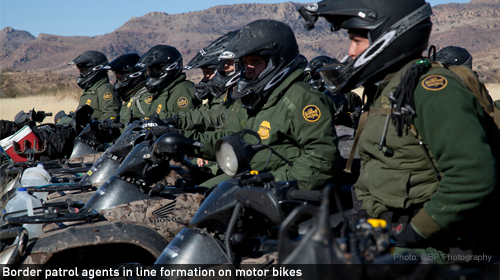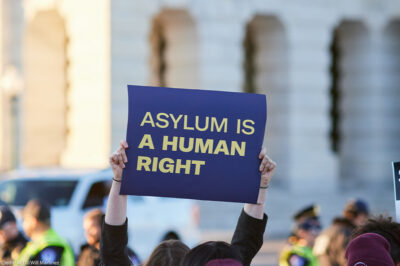
Yesterday, the world marked International Migrants Day, providing an opportunity to reflect on global efforts to respect and protect migrants’ human rights. It is particularly appropriate for us to call attention to U.S. government failure to protect the human and civil rights of communities and migrants along the U.S.’s border with Mexico.
This week, the Arizona Republic published a series of investigative reports that focused on the use of force by U.S. Customs and Border Protection (CBP) officials. The series, based on a review of thousands of documents obtained via Freedom of Information Act (FOIA) requests, detailed the shocking reality of CBP’s abusive use of force. According to the report, “Since 2005, on-duty Border Patrol agents and Customs and Border Protection officers have killed at least 42 people, including at least 13 Americans,” with a number of cases characterized as ‘highly questionable,’ some of which lacked thorough documentation of the incident and/or subsequent investigations.” The articles highlight the complete lack of accountability on the part of CBP and apparent impunity in cases of the deaths of migrants and U.S. citizens at the hands of CBP agents.
It’s about time that Congress and the Administration lift the shroud of secrecy that the Department of Homeland Security has placed over CBP, and publicly disclose investigations, its internal reviews, and the steps the agency plans to take to prevent the kind of abuses we know have taken place and continue to take place along the border. Not holding CBP officers and agents accountable when they commit abuses sends a clear message to the agency as a whole that the behaviors ignored are acceptable.
There are also additional cases of individuals who were the victims of CBP violence along the border who were not attempting to cross it. One such case is the fatal shooting of 15-year old Sergio Adrian Hernandez Guereca. In June 2010, a group of teenage boys played in the Rio Grande canal between El Paso and Ciudad Juárez, running up to the fence that stands on the U.S. side, tagging it, and running back down to the other side of the canal that is part of Mexico. A U.S. Border Patrol agent on a bicycle told them to stop, but the children continued to play in defiance. The agent rode his bicycle down and grabbed a teenager by the arm—the group scattered. Still grabbing on to the arm of one of the teenagers, the Border Patrol agent drew his weapon and fired, fatally shooting Sergio in the head. The agent, who was wearing a bicycle helmet, later claimed he was surrounded by a group throwing rocks at him, but this statement was contradicted by a witness who videotaped the encounter on a phone camera.
To date, none of the incidents reported in the Arizona Republic series, including Sergio’s killing, has resulted in a transparent investigation and none of the agents involved has been held publicly accountable. In many of these incidents, the names of the agents involved are not even known. Tragically, there are many families without answers about how and why their loved ones died.
This shroud of secrecy is even more troubling given the growth of the U.S. Border Patrol. Since 2004, the Border Patrol has nearly doubled from 10,800 agents to 21,400 agents today, with more than 18,500 just on the U.S.-Mexico border. A comprehensive immigration reform bill passed in the Senate in June would add another 20,000 Border Patrol agents to the U.S.-Mexico border.
CBP is now the largest law enforcement agency in the nation. And, unfortunately, this expansive growth has come with little oversight and negligible accountability, resulting in an equally massive increase in human and civil rights violations, perpetrated not just against migrants in CBP custody, but also against border communities, living on both sides of the border.
The most egregious form of abuse has been excessive use of force resulting in death, but this is only the tip of the iceberg. Abuses against border communities on the U.S. side include racial profiling and harassment, warrantless stops and questioning at checkpoints and during roving patrols north of the border, and failure to check on whether an immigrant is eligible for, or in the process of obtaining, immigration relief (such as Deferred Action for Childhood Arrivals, a U-Visa for domestic violence survivors, or asylum) before tearing them apart from their family and deporting them.
Abuses against migrants have ranged from agents spitting on their faces, running them down with horses and helicopters, yelling derisive terms and punching them, making them go hungry or thirsty, putting them in freezing rooms dressed in only t-shirts and jeans, and dumping them across the border in the middle of the night without their cell phones, IDs or money.
In the past three years alone, organizations and academic institutions have issued 7 separate reports documenting tens of thousands of incidents of abuse that are consistent with the stories discussed here, including the University of Arizona and George Washington University, Amnesty International, No More Deaths, Kino Border Initiative, Washington Office on Latin America, and the Binational Defense and Advocacy Program of the Northern Border Initiative.
In March of 2014, an ACLU delegation will travel to Geneva, Switzerland, to present a report about the continued abuses that occur under CBP’s watch as part of the United Nations’ review of the United States’ compliance with the International Covenant on Civil and Political Rights (ICCPR). We will be carrying the message that border communities and migrants should no longer be criminalized and dehumanized by our government and we will be asking for increased accountability and transparency for human rights violations at the US-Mexico Border. In short, we will be demanding an end to impunity for border killings and other abuses.
Learn more about customs and border enforcement and other civil liberty issues: Sign up for breaking news alerts, follow us on Twitter, and like us on Facebook.




